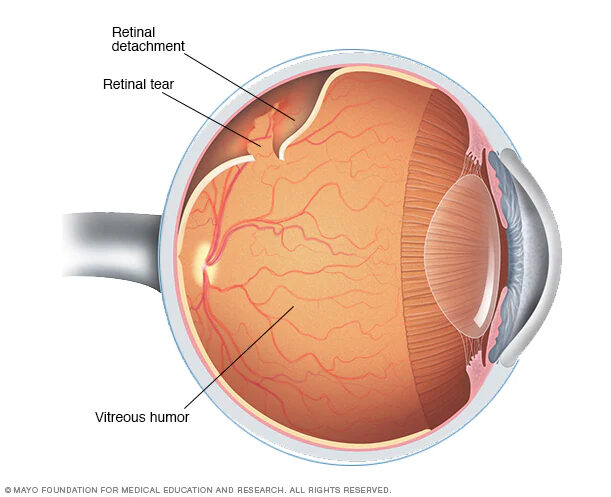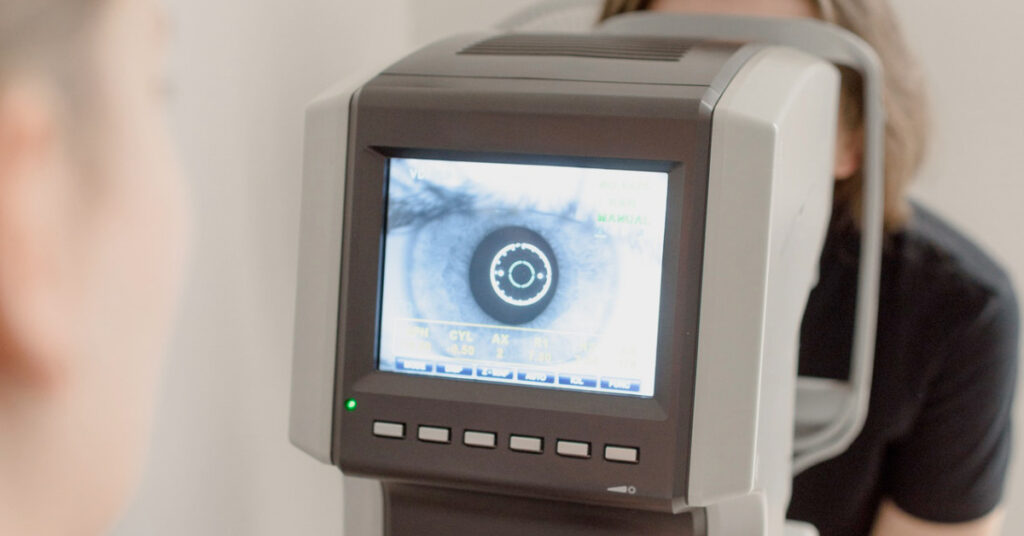The human eye is made up of many different working parts, and is both delicate and powerful in nature. One of its most essential parts is the retina. The retina is a thin layer of tissue that lines the back surface of the eye and receives & sends light signals to the brain. It provides the sharp, central vision needed for reading, driving, and seeing fine detail. Read more about the retina >>
When the retina pulls itself away from the tissue surrounding it, it’s called a retinal detachment. Retinal detachment separates the retinal cells from the blood vessels that provide it with oxygen. The longer retinal detachment goes untreated, the greater the risk of permanent vision loss. Reference the image for a visual of a detached retina.

Source: Mayo Clinic
Retinal Detachment Cause
There are 3 types of retinal detachment: rhegmatogenous, tractional, and exudative.
Rhegmatogenous
This is the most common type of retinal detachment and happens because of a retinal tear. It usually occurs with age and causes the vitreous gel that fills the eye to pull away from the retina. Ultimately, this will lead it to detach from the eye.
Tractional
This detachment is caused from scar tissue growing on the retina’s surface and pulling it from the retina. Diabetes is primarily the main cause of this type of detachment.
Exudative
In this detachment, fluid builds up behind the retina, but there is no tear. It is typically caused by age-related macular degeneration, eye injury, or uveitis.
Who is at Risk of Retinal Detachment?
Retinal detachment can occur at any age, but is most common over the age of 50. Other risk factors include:
- Having cataracts or glaucoma
- Previous eye surgery
- Previous retinal tear
- Family history of retinal detachment
- Extreme nearsightedness (myopia)
If you are at high risk for retinal detachment, talk to your ophthalmologist to set up an eye exam to protect your eye health.
Retinal Detachment Prevention
Some people may not experience any symptoms from a detached retina, while others will. If more of your retina is detached, you may notice sudden symptoms, including:
- Flashes and floaters
- A dark shadow in the middle of your field of vision
In order to help lower your risk of retinal detachment, it’s important to get regular eye care. The symptoms of retinal detachment often come on quickly and suddenly. If the retinal detachment isn’t treated right away, more of the retina can detach — which increases the risk of permanent vision loss or blindness.
Early evaluation by an eye doctor can significantly improve the prognosis and help to avoid permanent vision loss from a retinal detachment. Reach out today if you would like to schedule an appointment with Dr. Pandya. Dr. Pandya services the Dallas Fort Worth community with offices in both Plano and Waxahachie, Texas.

